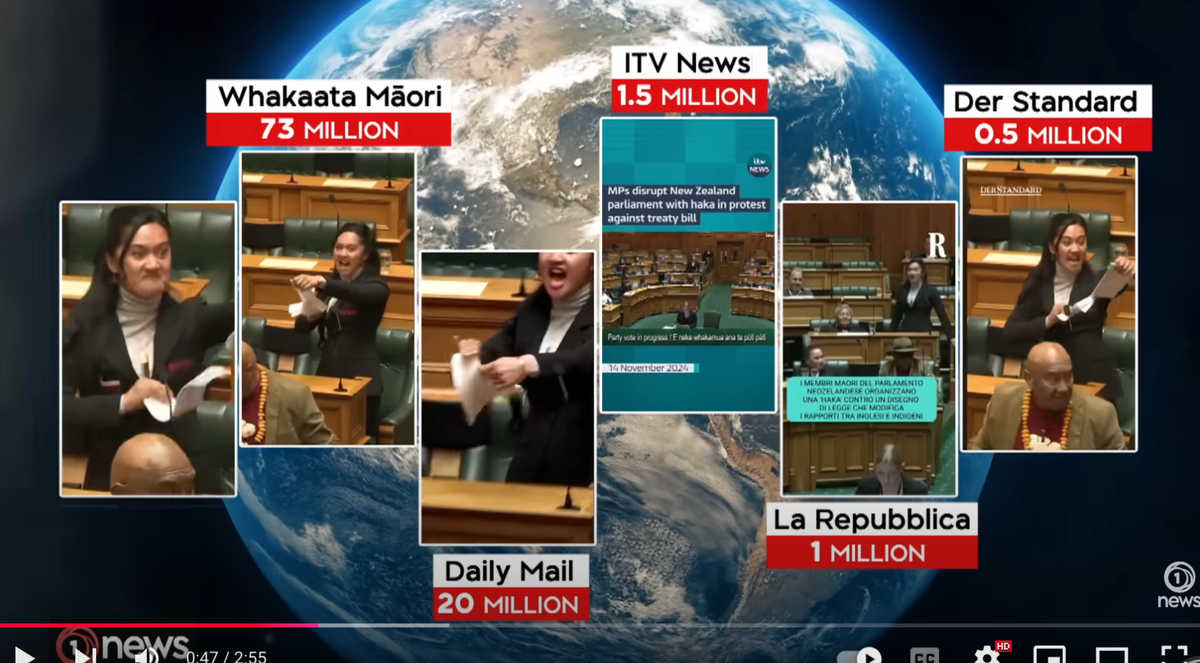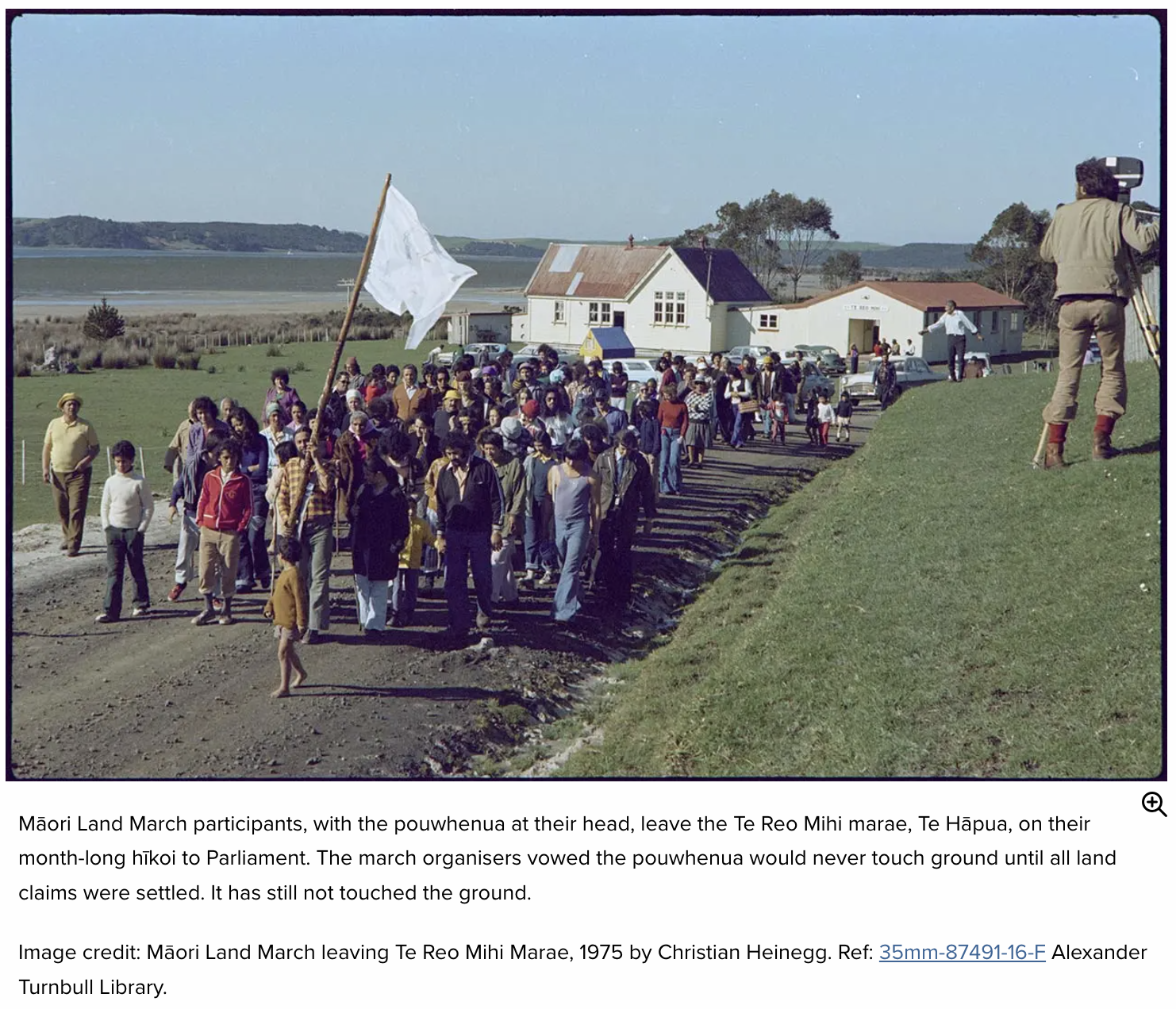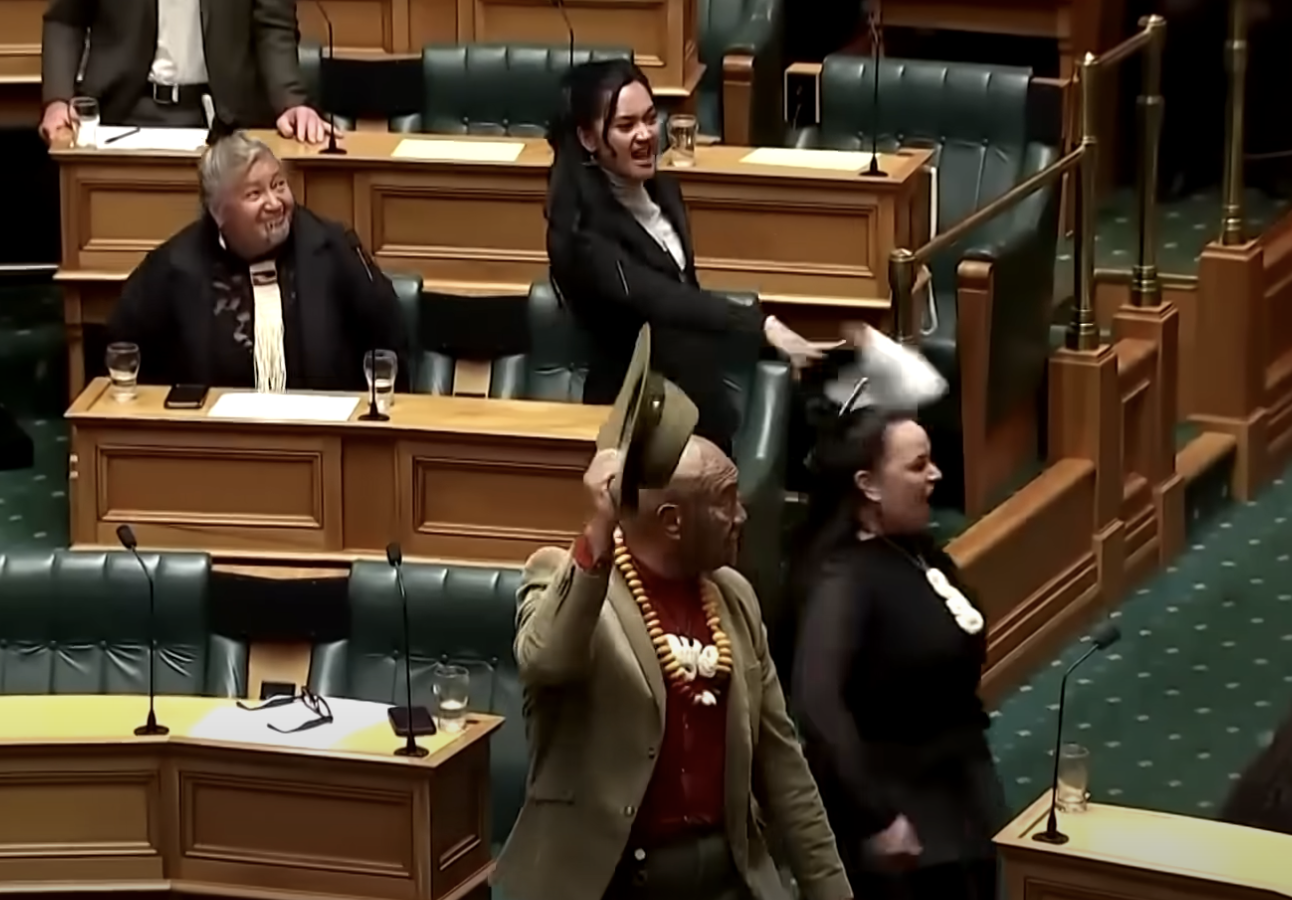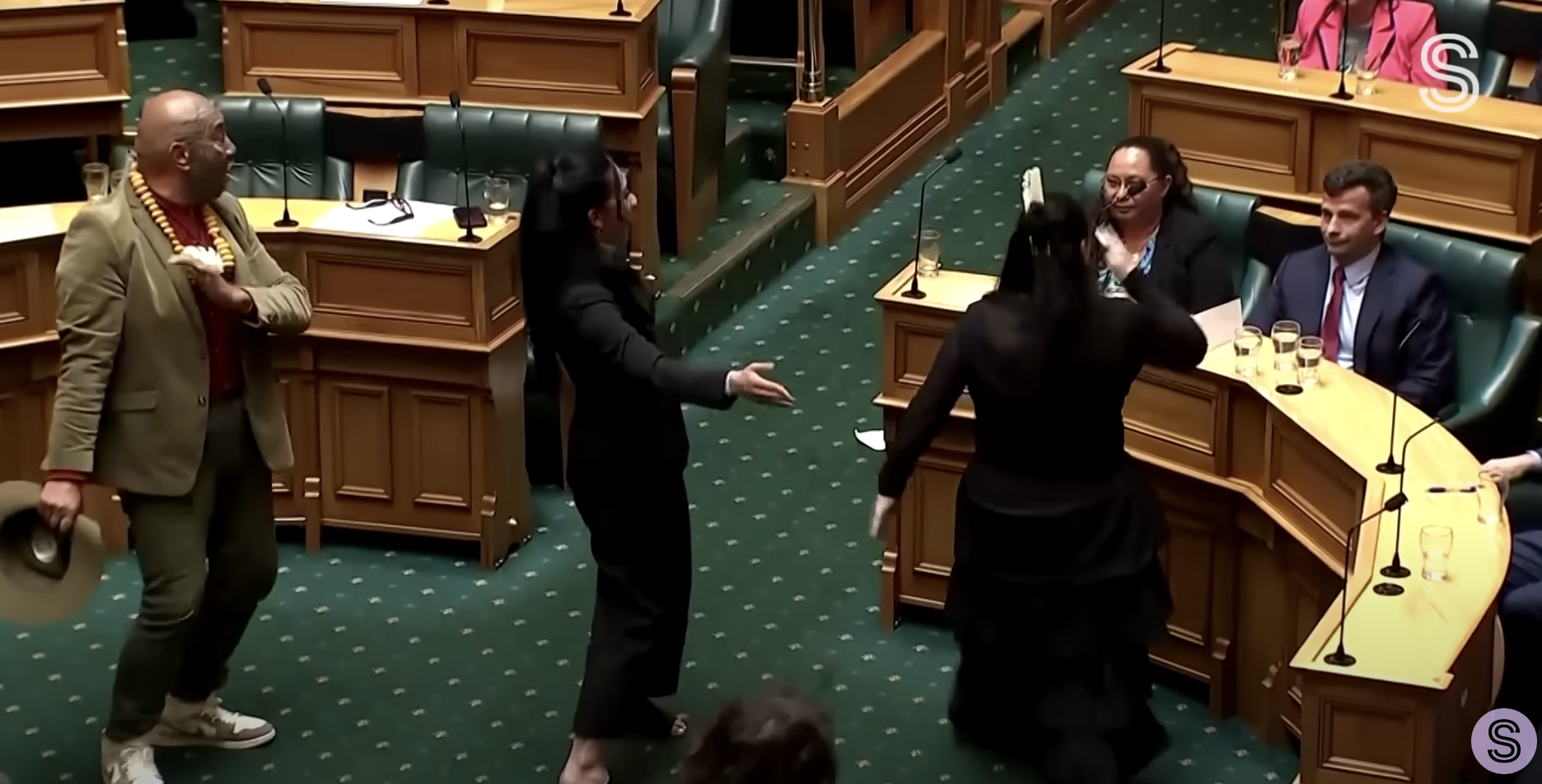
If, like me, you have lots of international mates, you may have been spending a bit of time explaining the deeper significance of the hīkoi and events in Parliament this week (and getting emotional about it). Here's a small offering (by no means comprehensive) that you can forward on to those who might appreciate slightly more context to go with the viral videos. I've added a few links throughout but please feel free to offer more commentary - this is a just a very light and easy-reading introduction. I've left out all the politics of MMP but if anyone wants to add or share links that explain how a minor right-wing faction of Government has managed to wrangle its influence in such a blatantly abusive way, feel free x
*
A wave of feet has been making its way from the tail of the fish to the head. Hīkoi. If you live on this land you can feel it. If you don't, you can see it, hear it, reverberating on newswires all around the world. Yesterday, Hana Rāwhiti Maipi Clarke, our baby of Parliament, stood in the House of Representatives and reminded the Government why it even exists.
*"Kāwana, ka whakamanuwhiritia koe e au!"
Government, you only exist by my say so!
Then she tore the Treaty Principles Bill in two and began to haka.
The full video showing the vote and the broader context. This is the one that shows the close-up angle.
Haka. An outpouring of spontaneous energy, the purest fuel a living body can tap into, the most unselfconscious, uninhibited expression of absolute truth that eyes and lips and limbs can express. Nothing reaches into your guts and drags everything towards it like haka. You cannot look away. You better not look away. Best to kneel.
The whole house followed Hana's lead, a thousand feet shaking loose the hive where it hung, ka mate, ka mate, ka ora ka ora** Famous and world-recognisable words smashing through hearts and windows. A grumpy oldster in charge of decorum rolled his bespeckled eyes and whined: "No, don't do that...." a split second before the wave engulfed him.
Trying to stop a haka is folly. I personally would rather try and stop the blade of a circular saw with my tongue than get in the way of haka. The speaker called the action "appallingly disrespectful and grossly disorderly," but the hit-count shows that behaviour in keeping with good taste and propriety is a matter of subjective opinion. Try telling a wave that's been building for seven generations where it's allowed to go, I dare you. Pākehā laws dreamed up yesterday could no more direct the energy of a haka than a tsunami making landfall after 180 years at sea.
Hana's maiden speech in Parliament last year. Must watch. So good.
Pride is one thing - here is a young person who was only dreamed of in 1975 when our people first decided to walk. They left from the very same place 49 years ago - Te Hāpua, the northern-most tip of Māui's fish (also known as New Zealand). They were propelled by a promise and a warning: "Not One More Acre." Not one more acre of land, of language, of geneology, of whakapapa.
Political strategy is another. The reason our leaders are so good at strategy is because three year political cycles are nothing. Parliamentary terms are pudding. Our people plan seven generations ahead as a starting point. And we're creative. Certain things might look coincidental are anything but.
The first land march took over 30 days and was led by a 79 year old grandmother, Dame Whina Cooper. She was the face of that 1,100 kilometre walk, but / and it was Ngā Tamatoa, the younger generation of visionary activists who urged her into the spotlight. She was the right person, with a lifetime of leadership preceding her, to be the tekoteko, the face of a movement - not merely a walk.
How we laugh today:
It won't be a lonely walk
"....My feet are beginning to ache already
The cracks on my Māori feet are beginning to widen
My blood turned on
Do not laugh
Laugh only when the blisters fade with the jaded politicians and their cunning
Laugh only when the small spies soft pies pie-eyed-freckled ladies and their mafia men with dark glasses are dug out like bed bugs from among us
Be watchful, watchful.."
Hone Tūwhare, beloved poet, 49 years ago: *Listen to the whole poem here.

There is a famous image of Whina Cooper on that first hīkoi walking hand in hand with her mokopuna along a gravel road. Looking at it, you understand why, when Hana took to the floor this week, it could only have been her. She was taking up a role she was always destined to. This is intergenerational mahi (work). Mokopuna, tūpuna. Reflections of one another. Unbreakable. Unshakeable.
One of the most beautiful things is reflected in the stance that each took up. Mariameno Kapa-Kingi, elder, smiles with pride as Hana moves forward. Debbie Ngarewa Packer steps to the front, Rāwiri Waititi falls behind. They are the physical embodiment of the outer flax leaves, protecting the heart, te rito o te harakeke.***


Not even 24 hours later, another whole generation is acting out Hana's example. Impersonating their idol on Tik Tok and therein embodying Whina's legacy - as well as Ngā Tamatoa's smarts, strategy, hard work and tenacity. All those who have gone before, still living and breathing inside those who can't even vote yet, each one play-acting the moment they too will get inside those rafters and shake the hive to the ground it came from.
My god, the sheer brilliance of it! The theatre, performance, the imaginative scope and creativity and potential.
I cry. We cry. And the world watches.
What was the paper that Hana tore in two?
New Zealand is often misguidedly commended for its so-called harmonious and non-violent race relations history. That is some colonial bolony. If the New Zealand government has ever done anything to improve its reputation internationally, it has not been because of benevolence or commitment to natural justice. It has been because our people have steadfastly refused - refused to lie down, Refused to stop marching, Refused to give up, to accept the unacceptable, to quit, to go away, to stop or to cease.****
In the wake of that first walk in 1975, the "Treaty Principles" first appeared in legislation. The principles are not without their problems [read more in context here] but they go some way at least to recognising that sovereignty was never ceded by Māori. It was taken violently and without consent.
The Treaty Principles were what helped to establish a permanent commission of inquiry to hear historical grievances and make rulings and recommendations for redress. The work of the Waitangi Tribunal and its impact on legislation since 1975 is unquantifiable. Reading these reports - writing them - waiting decades (and in many cases not living long enough to hear them) - is to bear witness to the horrendous truth of colonialism's nasty heart.
The Principles of the Treaty do not replace the articles of Te Tiriti o Waitangi. They contextualise what was intended and promised with what's happened since. They are an attempt to reconcile what some might say is irreconcilable today - the Māori text of Te Tiriti o Waitangi signed in 1840, and the English draft (very good explainer here). The principles are watered down, pragmatic, dynamic, interpretable, "living" as opposed to static.
In practice, the Principles try to make good on repeated and unforgivable murderous thieving fuck ups - and this is what the Act Party, the National Government's minor coalition partner, is trying to tear up. By introducing their Treaty Principles Bill, they attempt to rip up all this work, all this intention, all this spirit. Not since The Treaty was declared "a simple nullity" in 1890 have we seen such a blatant direct and unapologetic attack on our people and our constitutional foundations.
Even so, we laugh. Just like Hone Tūwhare predicted. Because David Seymour's political cunning is no match for intergenerational theatre. The youngest member of Parliament tearing this bill in two is a symbolic act that will live on as fuel in the imaginations of generations to come, just as the image of Whina Cooper walking a lonely road hand in hand with her mokopuna spurred us on for the last 49 years.
And think about it: The Treaty Principles were the seed that laid the foundation for the very language nests that grew up inside of Hana, and all her peers. That is why we can't stop watching. The poetry is wondrous. This is te ao wairua, the spirit world, tearing back the veil and reminding us how close we are, how interconnected everything is. This haka was set in motion decades ago, smuggled into Parliament like a trojan horse inside the bars of our babies' chests:
Government, you only exist here because of ME!
These are our ancestors speaking. Hana is but one of thousands yet to be born. She is, they are, the embodiment of our ancestors wildest dreams, set free to the drumbeat of a thousand poi, like spitfire Tūī flying straight for the face of the opposition, like an unstoppable tsunami of truth and justice finally making landfall.
Even if you don't know what the haka means. Even if you don't understand the words. Even if the politics are lost on you. You know how to kneel.
Notes:
*The videos circulating on social media are often cutting out the start of the haka out, but it is crucial to contextualise what follows, as explained by @tinangata. Here's a bit of background on Parliamentary rules and how the haka represents a direct to challenge to its culture. This haka will surely lay the groundwork to challenge what is recognised and permitted as legitimate protest and debate within the House of Parliament.
**Ka Mate is probably the most famous and well-known haka internationally - performed by the All Blacks since forever. It was composed by a Rangatira (chief) of Ngāti Toa, Te Rauparaha, in the midst of siege: "ka mate, ka mate, ka ora, ka ora" meaning "will I live, will I die?". This haka is protected in legislation, negotiated as part of Ngāti Toa's Treaty Settlement in 2012 - and is therefore directly connected to the Treaty Principles; no doubt another reason (of many) that it was selected.
***The longer version of this whakatauki goes:
Hutia te rito o te harakeke
Kei hea te kōmako e kō?
Kī mai ki ahau
He aha te mea nui?
He aha te mea nui o te ao?
Māku e kī atu
He tangata! He tangata! He tangata, hī!
Pull out the shoot of the flax bush
Where will the bellbird sing?
Say to me
What is the greatest thing?
What is the greatest thing in this world?
I will say
The people! The people! The people
****That the haka inspires the world today and is accepted and distinguished all over the world is not because this government has ever given us permission to perform it. We have continued to haka, even when we are expressly told to stop.
